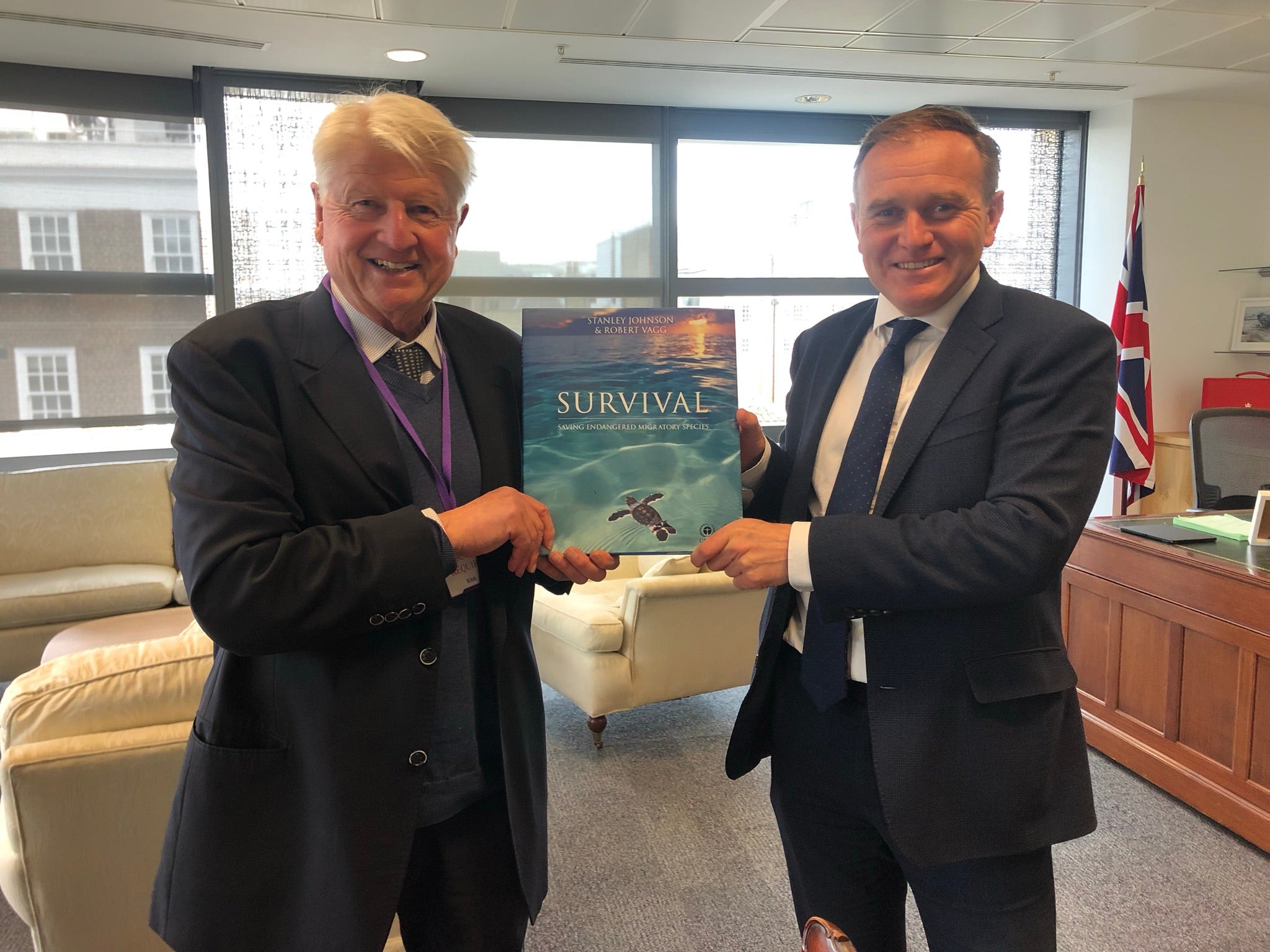The Conservatives are waging a war on nature – it must stop
I hope the new chancellor will send an urgent note to Jacob Rees-Mogg, asking him to scrap his proposed Retained EU Law Bill – or, at the very least, to kick it into the long grass, writes Stanley Johnson


Your support helps us to tell the story
From reproductive rights to climate change to Big Tech, The Independent is on the ground when the story is developing. Whether it's investigating the financials of Elon Musk's pro-Trump PAC or producing our latest documentary, 'The A Word', which shines a light on the American women fighting for reproductive rights, we know how important it is to parse out the facts from the messaging.
At such a critical moment in US history, we need reporters on the ground. Your donation allows us to keep sending journalists to speak to both sides of the story.
The Independent is trusted by Americans across the entire political spectrum. And unlike many other quality news outlets, we choose not to lock Americans out of our reporting and analysis with paywalls. We believe quality journalism should be available to everyone, paid for by those who can afford it.
Your support makes all the difference.Amid all the excitement of the last few days, the government does indeed seem to be drinking in the “last chancellor saloon”. How many battles can it fight, and on how many fronts? I can think of one battle at least, where the quarrel is entirely of this government’s own making.
In a letter sent to the prime minister, Liz Truss, on 3 October, more than 70 CEOs of the UK most prominent nature conservation organisations, including the National Trust, WWF, Wildlife Trusts, Green Alliance and Wildlife and Countryside Link, with a membership totalling more than 15 million voters, wrote: “Your government’s recent moves towards environmental deregulation will hasten the decline of our natural world.”
Judging from recent press and media reports, that campaign already has considerable traction.
Today, I would like to add my own personal plea to the government to “hold its fire” in what so many – not just those 70 CEOs – are coming to see as a “Conservative war on nature”.
What are my credentials for making such an appeal? Well, I have been an environmental campaigner for much of my life. As an MEP, I was vice-chair of the European Parliament’s Environment Committee for five years. I have written two dozen books on environmental topics. I am also currently the international ambassador of the Conservative Environment Network, which numbers more than 100 MPs – all of whom are pledged to support the Conservative manifesto commitment to “the most ambitious environmental programme on Earth”.
I was delighted that, as prime minister, my son Boris Johnson backed Cop27 president Alok Sharma to the hilt in pushing for meaningful international commitments on climate change at Cop27 in Glasgow. Boris persuaded the G7, in their meeting last summer in Carbis Bay, Cornwall, to focus on both the climate crisis and biodiversity. His DEFRA team – George Eustice, Richard Benyon, Zac Goldsmith and Rebecca Pow – delivered a new Environment Act, which for the first time ever contained a legally binding target on nature restoration.
So, what in heaven’s name has gone wrong, I asked myself as I read that letter from the CEOs. How have we managed in the space of a few short weeks to place a good record in jeopardy?
The current situation concerns me – and not just as a long-standing Conservative environmentalist. There has been an element of personal anguish too.
One of the proudest moments of my life came on October 10, 2015, when I was awarded the RSPB Medal for the part I had played in drafting the EU Habitats directive back in the 1980s. A few weeks later I received the “Leader of the Living Planet Award” from WWF International and a similar citation.

Thirty years after the Habitats Directive was adopted unanimously by the EU Council, Europe has the single largest network of protected areas anywhere in the world, known as Natura 2000.
The UK’s own contribution to Natura 2000 still covers almost six hundred sites, both terrestrial and marine, accounting for more than 9 per cent of the territory of the UK. These are truly the “crown jewels” of this country’s natural heritage. Based on criteria that include the protection of habitats as well as species, the sites cover wetlands, woodlands, moorlands, coastal zones, key landscapes – and some (but surely not enough?) marine protected areas.
Today, these crucial Natura 2000 sites – and all that they represent in terms of the UK’s ability to deliver on national and international commitments to nature protection – are at risk because the UK’s Habitat Regulations that govern those sites are themselves at risk.
So, who is the enemy here?
For my money, one major cause (among several) of the current “Tory war on nature” wears a double-breasted suit, speaks impeccable English, is infallibly polite and patient and is famous for having a nanny, even at his advanced age of 53. I am, of course, talking in the friendliest possible terms about the business secretary, Jacob Rees-Mogg.
Rees-Mogg, with his Retained EU Law (Revocation and Reform) Bill, is proposing that parliament should adopt a “sunsetting” mechanism that would apply to all EU-derived legislation. Any UK law that has its origin in an EU directive and which has not been rewritten, amended or specifically re-approved by the end of 2023 date would simply fall.
As far as the environment is concerned, the 70 CEOs believe that the EU Retained Law Bill – taken together proposals made in the Planning and Infrastructure Bill to weaken planning protection – could:
- Remove the legal basis and effective protection for the UK’s Natura 2000 sites
- Put paid to the chances of meeting legally binding climate and nature targets
- Create uncertainty for vulnerable businesses
- Shatter the long-term sustainability of our economy
- And unleash environmental losses that could reduce quality of life for millions of people
- Run the risk of sanctions and retaliations, not just from our continental neighbours but from other countries too, if we are seen to be seeking a competitive advantage through a ‘race to the bottom’ as far as environmental and other standards are concerned.

Last week, Professor Sir Dieter Helm, chair of the Natural Capital Committee, commented acidly that in the pursuit of the 2.5 per cent GDP growth target, the central pillars of Conservative environmental policies “are to be reviewed with a view to weakening and unwinding some of their key features”.
In addition to the “host of environmental protections” that will be lost by removing the transposed legislation, Professor Helm commented that the plans for new “investment zones” and further loosening on planning are all intended to weaken environmental protections; including those explicitly promised to be protected by the Brexit campaign in the EU referendum.
Professor Helm concluded: “Having painstakingly built up a green reputation, it has taken less than a month to seriously dent it. Credibility is hard to achieve and easy to dissipate.”
Jeremy Hunt, the new chancellor, of course, has a lot on his plate. But I hope he will somehow find time for a long chat with Professor Helm about the prospects for an alternative “growth” and a much more durable strategy; one that has – at its heart – the protection of the environment, nature and natural resources.
To keep up to speed with all the latest opinions and comment sign up to our free weekly Voices Dispatches newsletter by clicking here
For a start, I hope the new chancellor will send an urgent note to Rees-Mogg, asking him to scrap his proposed Retained EU Law Bill or, at the very least, to kick it into the long grass.
Over the next few days, the prime minister clearly has a lot of urgent work to do. She may not have been fully briefed on the disastrous environmental implications of what Rees-Mogg was planning with his EU Retained Law Bill.
But Liz Truss will know which way the wind is blowing. The 70 CEOs and 15 million voters have earnt the right to be taken seriously. I am sure new the secretary of state in Defra, Ranil Jayawardena – who until recently, served as the president of the all party group on endangered species – is following this issue with an eye much like one of those far-swooping mountain eagles we saw in the latest Attenborough documentary.
Jayawardena will surely also have a word to say – as Rees-Mogg is gently, and ever so politely, persuaded to think again.
Stanley Johnson is the international ambassador of the Conservative Environment Network
Join our commenting forum
Join thought-provoking conversations, follow other Independent readers and see their replies
Comments